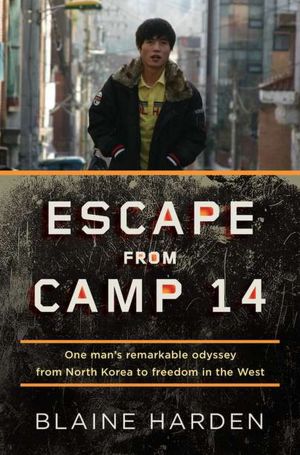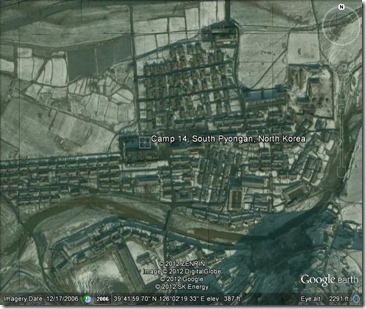
Shin Dong-hyuk still remembers his first execution. In a North Korean prison camp, attendance at executions is mandatory, regardless of age. The prisoner had rejected an opportunity of redemption, and was bound to wooden posts in a grassy field. The man’s mouth was stuffed with pebbles. His head was covered with a hood.
Shin Dong-hyuk was four years old, laying on the ground witnessing the execution of a man who spoke against the government of Kim Jong-il. Executions are common. Used as “teachable moments,” North Korean prison camps mandate the presence of every prisoner at executions to discourage any attempts to escape, and to encourage prisoners to snitch on other prisoners.
Later, in his teenage years, Shin himself would be directly responsible for at least two more deaths. His mother and older brother sat one night, eating a meager meal of rice, and conspired to escape. Shin eavesdropped, told a prison guard, and his mother and brother were later arrested. Shin himself was arrested and held in an underground prison for months. In the underground prison, Shin was tortured. From shackles attached at his wrists and ankles, Shin was suspended from a low ceiling, with his back exposed to hot coals. One of the guards pierced him through the abdomen with a hook to prevent him from squirming away from the heat. When Shin finally revealed he had been the one to turn his mother and brother into the guard, and the guard had corroborated his story, Shin was finally released. Upon his release, the prison community, included his father, turned out to witness the hanging of his mother, and the firing squad execution of his brother.
Hopefully, by now, dear reader, you are appalled as I was. How can a young boy of four years old even be in a prison camp?
Shin In Geun, who now goes by the name Shin Dong-hyuk, was born in Prison Camp 14, in North Korea. He, and hundreds of children like him, have known no other life, only growing up in a prison camp. The children have done nothing to deserve a life in a prison camp. They are simply the offspring of a parent, or parents, found guilty by the North Korean government of crimes against the State.
The next logical question comes with a somewhat illogical answer: “Then what did his parents do to end up in a prison camp?” In Shin’s case, his father did nothing against the North Korean government. Shin’s uncle, though, was thought to have aided and abetted the Japanese while the Japanese Empire controlled the Korean peninsula. Guilt-by-Association is a real and legitimate crime, punishable by imprisonment or death in North Korea. Aiding and abetting, or knowledge of someone’s intentions to escape, lie, or steal, are offenses commonly resulting in execution or a lifetime of imprisonment.
People who have studied Hitler’s prison camp system draw comparisons between those of the Nazi’s and those camps of Kim Jong-il. Guards manage the prisoners, teach, and oversee daily activities, mete out punishment. Prisoners pick up the slack, being encouraged to snitch on prisoners in order to receive more food, less work, more sleep. For very good behavior, a prisoner might be allowed to marry. Such an arrangement is termed, “reward marriage.” With appropriate permission, males and females may marry, receiving 5 days per year together. Children born from “reward marriage” are the only legitimate children allowed in the prison camp besides those who have accompanied their parents. Women who become pregnant from engaging in quid pro quo liaisons, to receive better food, more food, less work, with guards “disappear.”
In a North Korean prison camp, nearly every offense, no matter how slight could result in death. In grade school, a teacher killed a six-year old girl for having “stolen corn” by beating her on the head with his wooden pointer. Shin’s middle finger on his right hand was amputated for dropping a cast iron sewing machine during his stint in a plant which manufactured North Korean military uniforms.
 Camp 14 is known to defectors as one of the worst types of North Korean prison camps. From Shin’s account, I identified three types of camps. The first two types of camps were for “redeemables,” people who could be “re-educated,” usually by hard labor and daily recitations of North Korean political ideology. Short-term camps might require a stay of a few years. Longer-term camps might see one released after 25 to 50 years, if one was able to survive. Camp 14 and those like 14 were for “irredeemables.” According to the author, camps like 14 followed the commandment of Kim Jong-il: “three generations must pass before the stain of sin has passed from your family.” Prisoners born in a camp like 14 will never know any life beyond a portion of land about the size of a Kentucky county, 350-400 square miles, or 20 x 20 square miles.
Camp 14 is known to defectors as one of the worst types of North Korean prison camps. From Shin’s account, I identified three types of camps. The first two types of camps were for “redeemables,” people who could be “re-educated,” usually by hard labor and daily recitations of North Korean political ideology. Short-term camps might require a stay of a few years. Longer-term camps might see one released after 25 to 50 years, if one was able to survive. Camp 14 and those like 14 were for “irredeemables.” According to the author, camps like 14 followed the commandment of Kim Jong-il: “three generations must pass before the stain of sin has passed from your family.” Prisoners born in a camp like 14 will never know any life beyond a portion of land about the size of a Kentucky county, 350-400 square miles, or 20 x 20 square miles.
Shin’s life details how susceptible the human psyche is to conditioning, especially when born into an environment of absolute depravity. Parent are not parents, and siblings are not siblings. Everyone around you is a competitor for food and a potential threat. A friend one day might slap you in the face with a shovel and turn you over to a prison guard the next day simply to get your daily ration of food.
Reading Shin’s account, I can imagine some U.S. citizens declaring, “I would not have been that way; no one can make you do those things.” Our Western Mindset is a problem; our arrogance allows us to believe our constitution is greater than the constitution of others. If you were born under the conditions found in a North Korean prison camp, copious amounts of evidence suggests you would behave no different than a North Korean. Perhaps, if you were sentenced to a prison camp as an adult, yes, but not as a child, born of prisoner parents.
North Korea suffers famine upon famine. South Korea, Japan, and the United States typically partner to provide food assistance to the North Korean government. When I read the food aid generally ends up in the hands of the North Korean elite and faithful, and not in the hands of the vast majority of North Koreans, I became angry. North Korea allows little, if any, oversight of humanitarian aid. We simply set the food down at the door and walk away. On the other hand, prison camps are nearly self-sufficient. Prisoners primary jobs are to tend crops, spread fertilizer (made mostly from human feces), weed, sew, and make concrete. Later, amid yet another famine, international food aid became the catalyst which might ultimately be the undoing of the North Korean regime.
The famine experience in the early 2000s was as desperate as any in North Korea. Millions of people took to the countryside. People left cities to scavenge for food. When international aid arrived, a black market, a capitalist underground economy emerged nearly overnight. Military officers, civil servants, to back-alley merchants cropped up to buy-and-sell food aid. The North Korean government unable to control a rapidly developing capitalist underground economy, turned a blind eye.
The same black market has also aided in the defection of thousands of North Koreans. High-ranking military officials, civil servants, to transport clerks have developed an North Korean “Underground Railroad” of sorts, shuttling people out of North Korea. A “budget” defection may take a few months, with a defector ending up in China. A “Platinum” defection may take less than a week, more than $10,000 USD, with the defector arriving in China, South Korea, Japan, or even the United States. Defection “plan” names are my own invention, by the way.
North Korean defectors express many of the same psychological disorders of former Nazi POWs. Former North Korean prisoners are consumed by immense guilt, shame, and self-loathing now their actions have been framed in a new morality. Many are unable to acculturate to new social systems. Making friends is hard, keeping friends is hard, learning to trust people, and simply allowing one’s self to “feel” do not come easy. Former prison camp survivors may face a lifetime’s worth of post-traumatic stress.
Blaine Harden prose is tight and crisp. He pulls no punches from discussing Shin’s life, as Shin reveals intimate details of his thoughts, feelings, and actions both growing up within Camp 14, and as a young adult. Even today, 7 years after his escape, life does not seem to be particularly normal for Shin. Even with friends, and a host U.S. family, being able to sleep at night is not often a restful time.
Within the United States, Liberty in North Korea (LiNK) assists those who have successfully found their way from North Korea. In South Korea, the Korean Bar Association helps provide legal assistance to North Korean and is an important vetting organization. The North Korean government is known to send assassins aboard to kill defectors who speak out against the Dear Leader Kim Jong-il, even though Kim died in 2010.
At, 193 pages, “Escape From Camp 14,” can be read in an afternoon. Images described will haunt for much longer.
For what I offer is worth, I forgive Shin Dong-hyuk for all of his choices and actions. While forgiveness is not truly mine to give, I do not hold him responsible in any way. His life growing up within Camp 14 was neither his choice, nor were his choices while living within Camp 14 anything other than those which were normal and appropriate and which he had been raised to believe were true and proper.
Prison camps in North Korea have existed for over 50 years. Some people have been born, lived, and died knowing nothing but a North Korean prison camp.
Related information:
Database Center of North Korean Human Rights
Further Reading and Research:
“The Hidden Gulag:Exposing North Korea’s Prison Camps;” David Hawk. 2012.
“Nothing to Envy;” Barbara Demick. 2009. Available from Amazon & B&N.
No comments:
Post a Comment